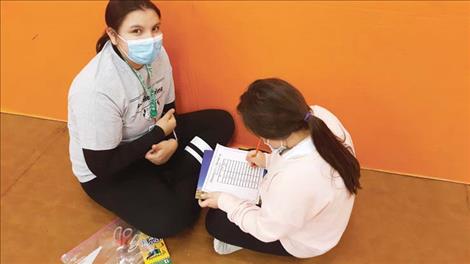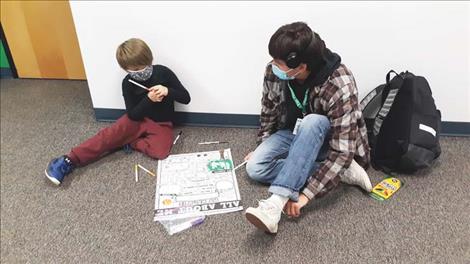Support program for kids continues after COVID shutdown
Hey savvy news reader! Thanks for choosing local.
You are now reading
1 of 3 free articles.
Claudia Hewston radiates optimism, and it’s contagious. On a chilly day in February, she’s at the Polson Boys and Girls Club for a weekly mentoring session.
During a session, one of the high school mentors in the 4-H National Mentoring Program that Hewston oversees is helping her mentee with spelling before they move on to making Valentine’s cards. “She got confused between giant and gigantic,” says Mackenna Torgenrud, a sophomore at Polson High, of her 9-year-old friend.
A little later, Hewston demonstrates finger-weaving to mentor Brookelyn Slonaker – a skill she will later impart to her mentee, a second grader at Cherry Valley Elementary School.
Brookelyn, a junior at Polson High with younger siblings, says the mentoring program is a natural fit for her. “I’ve always been really interested in early childhood development and I’m thinking of becoming a speech pathologist for children.”
She meets each week with her mentee, and together, they tackle homework or the program’s monthly activity, color, paint or just chat. “It’s really sweet to make connections and see someone once a week,” Brookelyn says.
Making connections is one of Hewston’s gifts, and it’s an essential part of this National 4-H Mentoring Program, made available through the MSU-Flathead Reservation Extension Office in Polson with funding from the Office of Juvenile Justice and Delinquency Prevention.
Although the extension office has received the grant for a decade and is the only recipient in Montana, the pandemic crippled the program. In October, when Hewston was hired, there were no mentor-mentee relationships in place.
“We had these great relationships that were built and then the schools were shut down and people lost contact with each other,” she says. “Mentors were coming to the office in tears because they didn’t get to see their mentees. COVID was hard on so many levels.”
Hewston, who grew up in Polson, is well suited to the task of bringing people together and fostering community. She was homeschooled by her parents, Michael and Joann Hewston, through eighth grade and then attended Polson High School. Along the way, she was active in a myriad of school and community activities, including sports, theater, volunteer firefighting and 4-H, which offered “curriculum enhancement” for Hewston and her two sisters.
She earned a degree in biology from the University of Providence, in Great Falls, and spent two years with AmeriCorps. During her first stint, she served as the Montana Smarts Schools coordinator, working with students across the state on environmental projects. “I got a lot of on-the-job training on how to build relationships with teachers and youth,” she says.
During her second go-around, she served as an education and outreach assistant with the National Wildlife Federation in Missoula. “I got to the point where I had so much random job experience, I didn’t know where it was going.”
When she heard about the job opportunity in Polson, all the tangents she had pursued suddenly made sense. Plus, it was an opportunity to return “to the community that helped raise me,” she says.
“It’s so exciting to give back by supporting our youth, encouraging them and showing them that they can be successful and that there are people in this community who care about them.”
Her first task was resuscitating the program by recruiting a new flock of mentors in Ronan and Polson. She made presentations at both schools, looking for freshmen and sophomores in particular, whose schedules would allow them to meet with youngsters ages 4-7 during their lunch breaks.
“Kids, during our interviews, would bring up things like, ‘I know what it’s like to not have someone be there for you,’” says Hewston.
Many of the mentor candidates were also reeling from the pandemic’s disruption to their own education. “It was very rewarding to be able to offer something for them in a time when everything is thrown off and they don’t know what they are, or are not, going to get to do.”
For the next step, she turned to counselors and teachers at both K. William Harvey and Cherry Valley elementary schools, who recommended children they thought would benefit from ongoing, one-on-one relationships with an older student. “Generally, these are kiddos who are struggling academically or socially for a variety of reasons,” says Hewston.
She adds that teachers, counselors and administrators in both school districts “have been just super-supportive.”
Counselors were especially crucial in the matchmaking process. “There’s a lot of collaboration that goes into making those relationships,” says Hewston.
She ended up with 22 mentors in Ronan and 11 in Polson, for a total of 33 pairs. Most teens meet once a week with their young protégés at the elementary schools. Those who don’t have time in their schedule gather after school with their mentees at the Boys and Girls Clubs in each town.
Hewston hopes the younger high school students “will stay with the program year to year, and just build those relationships” until they graduate.
In addition to helping youngsters with homework, mentors also focus on themed projects that typically wed a book with a creative undertaking.
This year, Hewston has patterned projects around the Circle of Courage – a Native American approach to youth development that emphasizes belonging, generosity, mastery and independence. These themes also correlate to the 4-H motto of Head, Heart, Hands and Health.
Each month, armed with pizza, she checks in with mentors and introduces the next theme. In January, they read “Stella Luna” with their mentees and helped them complete activities that centered on belonging. In February, they read “The Goat and the Rug” together, and learned finger weaving, which is a new skill that emphasized mastery. The theme for March is independence, and the program wraps up in April with generosity.
The mentors will assemble backpacks for their mentees to take home over the summer break, filled with monthly activities. Hewston also hopes to schedule an outdoor event where the pairs can meet face-to-face before school starts again.
Next year, she plans to expand the program further by inviting community members to participate, along with homeschool families.
Ultimately, she says, the program expands upon the values that shaped her own childhood: sharing knowledge, building character and strengthening community.
“An opportunity like this for teenagers teaches them independence, patience, adaptability, leaderships and team-building,” says Hewston.
And younger participants “are going to grow up knowing that they are in a community that supports them and loves them and is willing to help them grow up to be the best that they can be.”


















